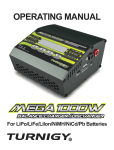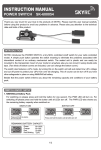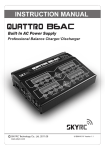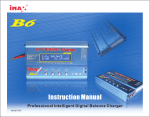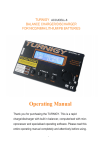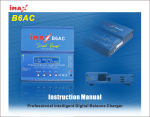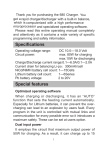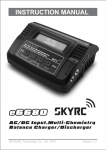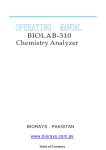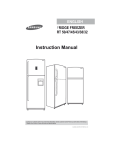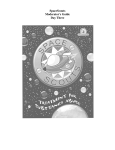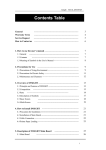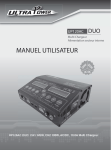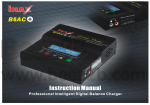Download Quattro B6AC Manual-NEW
Transcript
INSTRUCTION MANUAL Built-In AC Power Supply Professional Balance Charger/Discharger TABLE OF CONTENTS INTRODUCTION...................................................................................... 02 SPECIAL FEATURES............................................................................. 04 WARNING AND SAFETY NOTES......................................................... 06 PROGRAM FLOW CHART...................................................................... 10 LITHIUM BATTERY(LIPO/LILO/LIFE)PROGRAM................................... 11 Charging Lithium battery at balance mode................................................ 12 Charging of Lithium Battery....................................................................... 12 ‘FAST' charging of Lithium battery............................................................. 13 'STORAGE' control of lithium battery......................................................... 14 Discharging Lithium battery....................................................................... 14 Pb( lead-sulphuric acid) battery program................................................ 15 Charging of Pb battery............................................................................. 15 Discharging of Pb battery........................................................................... 15 NIMH/NICD BATTERY PROGRAM......................................................... 16 Charging of NiCd/NiMH battery.................................................................. 16 Charging NiCd/NiMH battery in the AUTO charge mode........................... 16 Discharging of NiCd/NiMH battery.............................................................. 16 Charging NiCd/NiMH Battery In Re-Peak Charge Mode............................ 17 Charge/discharge & discharge/charge cycle of NiMH/NiCd battery........... 17 BATTERY MEMORY SET........................................................................ 17 LITHIUM BATTERY METER..................................................................... 19 PROGRAM SET UP................................................................................. 20 VARIOUS INFORMATION DURING THE PROCESS.............................. 22 WARNING AND ERROR MESSAGE..................................................... 23 SPECIFICATION...................................................................................... 24 RECOMMENDED ACCESSORIES......................................................... 25 CONFORMITY DECLARATION.............................................................. 26 WARRANTY AND SERVICE.................................................................. 26 INTRODUCTION INTRODUCTION Congratulations on your choice of the SKYRC QUATTRO B6AC digital intelligent charger from SKYRC Technology Co., Ltd. You are now the owner of a compact charger with battery management and integral balancer. The unit is simple to use, but the operation of a sophisticated automatic charger such as the SKYRC QUATTRO B6AC does require some knowledge on the part of the user. These operating instructions are designed to ensure that you quickly become familiar with its functions. It is therefore important that you read right through the Operating Instructions, Warning and Safety Notes before you attempt to use your new automatic charger for the first time. We hope you have many years of pleasure and success with your new battery charger. SKYRC QUATTRO B6AC is a high-performance, micro processor control charge/discharge station with battery management suitable for use with all current battery types. With integral equalizer for six-cell Lithium-Ion (LiIon), Lithium-Polymer (LiPo) and Lithium-Ferrum (LiFe) batteries. Maximum 6A charge current; can be powered by a 12 Volt car battery or from 100V-240V via the built in switch-mode power supply. And the circuit features four totally independent identical power outputs which are powered 50 watts each. Total powers are 200 watts. As a result , it can charge or discharge up to 4 x 15 cells of NiCd/NiMH or 4 x 6 series of Lithium batteries simultaneously. Quattro B6AC has four individual cell voltage balancer at each outputs, so it does not required any balancer separately when charging Lithium Battery (LiPo/LiIon/LiFe) for voltage balancing. When a Nickel battery is fully charged, the unit terminates the process using the Delta-Peak method. Lithium and lead (Pb) batteries are charged using the CC-CV method. The fan cooling system is so smart and efficient. The fan speed is controlled by internal temperature sensor. Following instructions only apply to one of the four chargers, as all of them operate according to same principle. Please BE SURE to read these instructions and Warning and Safety Notes before you use the charger for the first time. It can be dangerous to mis-handle batteries and battery chargers, as there is always a risk of batteries catching fire and exploding. Liability Exclusion This charger is designed and approved exclusively for use with the types of battery stated in these Instruction Manual. SKYRC accepts no liablility of any kind if the charger is used for any purpose other than that stated. We are unable to ensure that you follow the instructions supplied with the charger, and we have no control over the methods you employ for using, operating and maintaining the device. For this reason we are obliged to deny all liability for loss, damage or costs which are incurred due to the incompetent or incorrect use and operation of our products, or which are connected with such operation in any way. Unless otherwise prescribed by law, our obligation to pay compensation, regardless of the legal argument employed, is limited to the invoice value of those SKYRC products which were immediately and directly involved in the event in which the damage occurred. INTRODUCTION Please read this entire operating manual completely and attentively before using this product, as it covers a wide range of information on operating and safety. Or please do use this product in company with a specialist! LCD Screen Menu Control Buttons Menu Control Buttons Battery Sockets DC Input Socket Battery Sockets AC Input Power Port 100-240V AC 100-240V AC Universal Balancing Port Pitch=2.54mm Temp. Sensor/PC Link Available for output 1 & 3 only Battery Sockets Ventilation Fan with Temperature Sensor Control Universal Balancing Port Pitch=2.54mm Temp. Sensor/PC Link Available for output 2 & 4 only SPECIAL FEATURES SPECIAL FEATURES SKYRC QUATTRO B6AC allows you to plug 4 batteries into one charger simultaneously, and it will intelligently and automatically charge all 4 of them at once to their maximum capacity. To top of it, the batteries being charged do not even need to have the same configuration. You can connect different chemistry(Ni-MH/Ni-CD/LiPo/LiFe)batteries into any of the charging ports. No more staying up late for charging batteries. Optimized operating software SKYRC QUATTRO B6AC features the so-called AUTO function that set the feeding current during the process of charging or discharging. Especially for Lithium batteries, it can prevent the overcharging which may lead to an explosion due to the user's fault. It can disconnect the circuit automatically and alarm once detecting any malfunction. All the programs of this product were controlled through two way linkage and communication, to achieve the maximum safety and minimize the trouble. All the settings can be configured by users! Internal independent lithium battery balancer SKYRC QUATTRO B6AC employs an individual-cell-voltage balancer. It isn't necessary to connect an external balancer for balance charging. Balancing individual cells battery discharging During the process of discharging, SKYRC QUATTRO B6AC can monitor and balance each cell of the battery individually. Error message will be indicated and the process will be ended automatically if the voltage of any single one cell is abnormal. Adaptable to various type of lithium battery SKYRC QUATTRO B6AC is adaptable to various types of Lithium batteries, such as Li-ion, LiPo and the new LiFe series of batteries. SPECIAL FEATURES Fast and storage mode of lithium battery Purposes to charge Lithium battery varies, 'fast' charge reduce the duration of charging, whereas 'store' state can control the final voltage of your battery, so as to store for a long time and protect useful time of the battery. Maximum safety Delta-peak sensitivity: The automatic charge termination program based on the principle of the Delta-peak voltage detection. When the battery's voltage exceeds the threshold, the process will be terminated automatically. Automatic charging current limit You can set up the upper limit of the charging current when charging your NiCd or NiMH battery, it is useful for the NiMH battery of low impedance and capacity in the 'AUTO' charging mode. Capacity limit The charging capacity is always calculated as the charging current multiplied by time. If the charging capacity exceeds the limit, the process will be terminated automatically when you set the maximum value. Temperature threshold* The battery's internal chemical reaction will cause the temperature of the battery to rise. If the temperature limit is reached, the process will be terminated. * This function is available by connecting optional temperature probe, which is not included in the package. Processing time limit: You can also limit the maximum process time to avoid any possible defect. Data store/load The maximum ten batteries' data can be stored for each output(10X4SET). You can keep the data pertaining to program setting of the battery of continuous charging or discharging. Users can call out these data at any time without any special program setting. Cyclic charging/discharging 1 to 5 cyclic and continuous process of charge>discharge or discharge>charge is operable for battery refreshing and balancing to stimulate the battery's activity. Terminal voltage control(TVC) The charger allows user to change the end voltage. Lipo battery meter The user can check battery's total voltage, the highest voltage, the lowest voltage and each cell's voltage. PFC (Power Factor Correction) internal integrated WARNING AND SAFETY NOTES WARNING AND SAFETY NOTES These warnings and safety notes are particularly important. Please follow the instructions for maximum safety; otherwise the charger and the battery can be damaged or at worst it can cause a fire. Never leave the charger unattended when it is connected to its power supply. If any malfunction is found, TERMINATE THE PROCESS AT ONCE and refer to the operation manual. Keep the charger well away from dust, damp, rain, heat, direct sunshine and vibration. Never drop it. The allowable DC input voltage is 11-18V DC. The allowable AC input voltage is 100-240V AC. This charger and the battery should be put on a heat-resistant, non-flammable and non-conductive surface. Never place them on a car seat, carpet or similar surface. Keep all flammable volatile materials away from the operating area. Make sure you know the specifications of the battery to be charged or discharged to ensure it meets the requirements of this charger. If the program is set up incorrectly, the battery and charger may be damaged. Fire or explosion can occur due to overcharging. This warranty is not valid for any damage or subsequent damage arising as a result of a misuse or failure to observe the procedures outlined in this manual. To avoid short circuiting between the charge lead, always connect the charge cable to the charger first, then connect the battery. Reverse the sequence when disconnecting. Never attempt to charge or discharge the following types of batteries: A battery pack which consists of different types of cells (including different manufacturers) A battery that is already fully charged or just slightly discharged Non-rechargeable batteries (pose an explosion hazard) Batteries that require a different charge technique from NiCd, NiMh, LiPo or gel cell (Pb, lead-acid battery) A faulty or damaged battery A battery fitted with an integral charge circuit or a protection circuit Batteries installed in a device or which are electrically linked to other components Batteries that are not expressly stated by the manufacturer to be suitable for the currents the charger delivers during the charge process WARNING AND SAFETY NOTES Please bear in mind the following points before commencing charging: Did you select the appropriate program suitable for the type of battery you are charging? Did you set up adequate current for charging or discharging? Have you checked the battery voltage? Lithium battery packs can be wired in parallel and in series, i.e. a 2-cell pack can be 3.7V (in parallel) or 7.4V (in series). Have you checked that all connections are firm and secure? Make sure there are no intermittent contacts at any point in the circuit. Standard Battery Parameters LiPo LiIon LiFe NiCd MiMH Pb Nominal Voltage 3.7V/cell 3.6V/cell 3.3V/cell 1.2V/cell 1.2V/cell 2.0V/cell Max Charge Voltage 4.2V/cell 4.1V/cell 3.6V/cell 1.5V/cell 1.5V/cell 2.46V/cell Storage Voltage 3.8V/cell 3.7V/cell 3.3V/cell n/a n/a n/a Allowable Fast Charge ≦1C ≦1C ≦4C 1C-2C 1C-2C ≦0.4C Min. Discharge 3.0-3.3V/cell 2.9-3.2V/cell 2.6-2.9V/cell 0.1-1.1V/cell 0.1-1.1V/cell 1.8V/cell Voltage Be very careful to choose the correct voltage for different types of battery otherwise you may cause damage to the batteries. Incorrect settings could cause the cells to fire or explode. WARNING AND SAFETY NOTES Charging During charge process, a specific quantity of electrical energy is fed into the battery. The charge quantity is calculated by multiplying charge current by charge time. The maximum permissible charge current varies depending on the battery type or its performance, and can be found in the information by the battery manufacturer. Only batteries that are expressly stated to be capable of quick-charge are allowed to be charged at rates higher than the standard charge current. Connect the battery to the terminal of the charger: red is positive and black is negative. Due to the difference between resistance of cable and connector, the charger can not detect resistance of the battery pack, the essential requirement for the charger to work properly is that the charge lead should be of adequate conductor cross-section, and high quality connectors which are normally gold-plated should be fitted to both ends. Always refer to the manual by the battery manufacturer pertaining to charging methods. Operate according to their recommended charging current and charging time. Lithium batteries, in particular, should be charged strictly according to the manufacturer’s instruction. Close attention should be paid to the connection of Lithium batteries. Do not attempt to disassemble the battery pack arbitrarily. Please get highlighted that Lithium battery packs can be wired in parallel and in series. In the parallel connection, the battery's capacity is calculated by multiplying single the battery's capacity by the number of cells, bearing in mind that total voltage stays the same. If the voltage is imbalanced, it may cause a fire or explosion. Lithium batteries are recommended to charge in series. WARNING AND SAFETY NOTES Discharging The main purpose of discharging is to clean the residual capacity of the battery, or to reduce the battery' voltage to a defined level. The same attention should be paid to the discharging process as the charging process. The final discharge voltage should be set up correctly to avoid deep discharging. Lithium batteries cannot be discharged to lower than the minimum voltage, or it will cause a rapid loss of capacity or a total failure. Generally, Lithium batteries don't need to be discharged. Please pay attention to the minimum voltage of Lithium batteries to protect them. Some rechargeable batteries have a memory effect. If they are partly used and recharged before the whole charge is accomplished, they remember this and will only use that part of their capacity next time. This is a 'memory effect' It is said that NiCd and NiMH batteries are suffering from memory effect. NiCd has more ‘memory effect’ than NiMH. Lithium batteries are recommended to be discharged partially rather than fully. Frequent full discharging should be avoided if possible. Instead, charge the battery more often or use a battery of larger capacity. Full capacity cannot be reached until it has been subjected to 10 or more charge cycles. The cyclic process of charge and discharge will optimize the capacity of battery pack. PROGRAM FLOW CHART PROGRAM FLOW CHART INC DEC PROGRAM SELECT LiPo BATT INC Lilo BALANCE 2.0A 7.2V (2S) DEC LiFe BALANCE 2.0A 6.6V (2S) DEC 4.20 4.19 4.19 V 0.00 0.00 0.00 V DEC Rest Time CHG>DCHG 10Min DEC INC LiPo CHARGE 2.0A 7.4V (2S) DEC Lilo CHARGE 2.0A 7.2V (2S) DEC LiFe CHARGE 2.0A 6.6V (2S) DEC INC LiPo FAST CHG 2.0A 7.4V (2S) DEC Lilo FAST CHG 2.0A 7.2V (2S) DEC LiFe FAST CHG 2.0A 6.6V (2S) DEC Capacity Cut-Off ON 5000mAH DEC INC LiPo STORAGE 2.0A 7.4V (2S) DEC Lilo STORAGE 2.0A 7.2V (2S) DEC LiFe STORAGE 2.0A 6.6V (2S) DEC INC LiPo DISCHARGE 2.0A 7.4V (2S) START ENTER INC INC INC INC Lilo DISCHARGE 2.0A 7.2V (2S) START ENTER INC INC INC INC LiFe DISCHARGE 2.0A 6.6V (2S) DEC PROGRAM SELECT Li BATT METER INC DEC DEC PROGRAM SELECT LiFe BATT INC LiPo BALANCE 2.0A 7.4V (2S) DEC PROGRAM SELECT Lilo BATT INC START ENTER START ENTER INC MAIN 0.00V H0.000V L0.000V DEC PROGRAM SELECT SYSTEM SET-> START ENTER INC SAFETY TIME ON 120Min INC DEC INC Key Beep Buzzer ON ON INC DEC Input Power Low Cut-Off 11.0V INC Stop 1.00 Batt Type PROGRAM SELECT BATT MEMORY START ENTER BATT MEMORY [1] ENTER SET INC VERSION INC DEC START ENTER BATT TYPE LiPo INC DEC BATT VOLTS 7.4V ( 2S ) DEC INC DEC INC LOAD FACTORY SET ENTER DEC CHARGE CURRENT 4.9A DEC INC DEC Ext.Temp Int. Temp 0C 37C DSCH CURRENT 2.2A INC DEC DSCH VOLTAGE 3.0V/CELL INC BATT MEMORY [1] LiPo 7.4V (2S ) BATT MEMORY [1] C:4.9A D:2.2A INC INC DEC ENTER START START ENTER INC SAVE PROGRAM SAVE…. DEC LiPo CHARGE 4.9A 7.4V(2S) DEC BATT VOLTS 2.4V (2S) DEC INC SAVE PROGRAM ENTER DEC LiPo FAST CHG 4.9A 7.4V(2S) DEC CHARGE CURRENT 3.3A DEC INC TEMPERATURE CUT-OFF 50C DEC LiPo STORAGE 4.9A 7.4V(2S) DEC TRICKLE 100mA DEC DEC INC ENTER CHARGER LOAD…… DEC BATT MEMORY 2 NiMH 2.4V (2S) ENTER START LiPo BALANCE 4.9A 7.4V(2S) DEC BATT TYPE MiMH DEC INC INC INC INC INC INC INC INC LiPo DISCHARGE 2.2A 7.4V(2S) PEAK DELAY 1Min INC ENTER START BATT MEMORY 3 Pb 4V (2S) START ENTER INC SAVE PROGRAM ENTER DEC BATT TYPE Pb DEC INC INC DELTA PEAK SENSE 4Mv/C DEC BATT VOLTS 4.0V (2S) DEC INC INC DSCH VOLTAGE 1.1V/CELL DEC CHARGE CURRENT 3.3A DEC INC INC DSCH CURRENT 2.2A DEC DSCH CURRENT 1.5A DEC INC INC ENTER Pb CHARGE 2.0A 2.0V (1P) DEC NiCD CHARGE CURRENT 2.0A DEC NiMH CHARGE CURRENT 2.0A DEC INC Pb DISCHARGE 0.1A 2.0V (1P) INC SAVE PROGRAM ENTER DEC DEC PROGRAM SELECT NiCD BATT INC START START ENTER INC INC NiCD Auto CHARGE CURRENT 2.0A DEC NiMH Auto CHARGE CURRENT 2.0A DEC INC NiCD DISCHARGE 0.1A CUT: 1.0V DEC NiMH DISCHARGE 0.1A CUT: 1.0V DEC INC NiCD RE-PEAK 1 DEC NiMH RE-PEAK 1 DEC NiCD CYCLE CHG>DCHG 1 NiMH CYCLE CHG>DCHG 1 DEC PROGRAM SELECT NiMH BATT START ENTER INC INC INC INC DEC TEMPERATURE CUT-OFF 50C DSCH VOLTAGE 1.7V/CELL INC PROGRAM SELECT Pb BATT DEC TVC=YOUR RISK 4.20V DEC TEMPERATURE CUT-OFF 50C LITHIUM BATTERY(LIPO/LILO/LIFE)PROGRAM CONNECTING THE CHARGER SKYRC QUATTRO B6AC comes with the built in switching power supply. You can connect the AC power cord directly to the main AC socket. (100-240V AC) For attaching directly to 12V car batteries. It is critically important that you use a fully charged 13.8V car battery . Using terminal clip attaching to car battery CONNECTING THE BATTERY Important !!! Before connecting a battery it is absolutely essential to check one last time that you have set the parameters correctly. If the settings are incorrect, the battery may be damaged, and could even burst into flames or explode. To avoid short circuits between the banana plugs, always connect the charge leads to the charger first, and only then to the battery. Reverse the sequence when disconnecting the pack. Balance socket: The balance wire attached to the battery must be connected to the charger with the black wire aligned with the negative marking. Take care to maintain correct polarity! (See the wiring diagram below.) This diagram shows the correct way to connect your battery to the SKYRC QUATTRO B6AC while charging in the balance charge program mode only. WARNING: Failure to connect as shown in this diagram will damage this charger. LITHIUM BATTERY(LIPO/LILO/LIFE)PROGRAM These programs are only suitable for charging and discharging Lithium batteries with a nominal voltage of 3.3V, 3.6V and 3.7V per cell. These batteries need to adopt different charge technique is termed a constant voltage(CV) and constant current(CC) method. The charge current varies according to the battery capacity and performance. The final voltage of charge process is also very important; it should be precisely matched with the charade voltage of the battery. They are 4.2V for LiPo, 4.1V for Lilo, and 3.6 V for LiFe. The charge current and nominal voltage as for cell count set on the charge program must always be correct for the battery to be charged. When you are willing to alter the parameter value in the program, press Start/Enter key to make it blink then change the value with INC or DEC key. The value will be stored by pressing Start/Enter key once. CHARGING LITHIUM BATTERY AT BALANCE MODE This function is for balancing the voltage of Lithium-polymer battery cells while charging. In the balance mode, the battery needs to have a balance lead to connect to the battery's power lead to the output of charger. In this mode, the charging process will be different from ordinary charging mode. The internal processor of the charger will monitor the voltages of each cell of the battery pack and controls charging current that is feeding to each cell to normalise the voltage. Note: We recommends charging lithium batteries with a balance lead in the balance mode only. - + DEC INC Batt type Stop - + DEC INC Start Enter '> 3 seconds' Start Enter The left side of the first line shows the type of battery you choose. The value on the left of the second line of the charger is current user set. After setting the current and voltage, press Start/Enter key for more than 3 seconds to start the process.(charge current: 0.1-6.0A, voltage: 2S-6S). This displays the number of cells you set up and the processor detects. R shows the number of cells detected by the charger and S is the number of cells set by you at the previous screen. If both numbers are identical you can start charging by press Start/Enter button. If not, press Batt Type/Stop button to go back to previous screen to carefully check the number of cells of the battery pack before going ahead. This screen shows the real-time status during charge process. Press Batt Type/Stop key once to stop the charge process. Number Charging Battery of voltage Charged time capacity cells Charging current CHARGING OF LITHIUM BATTERY This charging mode is for charging Li-Po/Ion/Fe battery without balance lead. Note: We recommends charging lithium batteries with a balance lead in the balance mode only. LITHIUM BATTERY(LIPO/LILO/LIFE)PROGRAM - + DEC INC Batt type Stop The left side of the first line shows the type of battery you choose. The value on the left of the second line of the charger is current user set. After setting the current and voltage, press Start/Enter - + DEC INC key for more than 3 seconds to start the process.(charge current: Start '> 3 seconds' 0.1-6.0A, voltage: 1S-6S). Enter This displays the number of cells you set up and the processor detects. R shows the number of cells detected by the charger and S is the number of cells set by you at the previous screen. If both numbers are identical you can start charging by press Start/Enter button. If not, press Batt Type/Stop button to go back to previous screen to carefully check the number of cells of the battery pack before going ahead. Start Enter Number Charging Battery of voltage Charged time capacity cells Charging current This screen shows the real-time status during charge process. Press Batt Type/Stop key once to stop the charge process. ‘FAST' CHARGING OF LITHIUM BATTERY The charging current is getting smaller as the process goes to the near end term of Lithium battery charging. To finish charging process earlier, this program eliminate certain term of CV process. Actually, the charging current will goes to 1/5 from the initial value to end the process while the normal charging goes to 1/10 during CV term. The charging capacity may be a bit smaller than normal charging but the process time will be reduced. - + DEC INC Batt type Stop - + DEC INC The value on the left side of the second lines sets the charge current. The value on the right side of the second lines sets the battery pack's voltage. After setting current and voltage, press Star/Enter for more than 3 seconds to start the process. Start '> 3 seconds ' Enter Start Enter Charging Supplied Current Number time capacity voltage battery of Charge cells current This displays the number of cells you set up and the processor detects. R shows the number of cells detected by the charger and S is the number of cells set by you at the previous screen. If both numbers are identical you can start charging by press Start/Enter button. If not, press Batt Type/Stop button to go back to previous screen to carefully check the number of cells of the battery pack before going ahead. This screen shows the real-time status during charge process. Press Batt Type/Stop key once to stop the charge process. LITHIUM BATTERY(LIPO/LILO/LIFE)PROGRAM 'STORAGE' CONTROL OF LITHIUM BATTERY This is for charging or discharging Lithium battery not to be used for the time being. The program will determine to charge or discharge the battery to the certain voltage depending on the voltage of the battery at its initial stage. They are different from the type of the battery, 3.75V for LiIo, 3.85V for LiPo and 3.3V for LiFe per cell. If the voltage of battery at its initial stage is over the voltage level to storage, the program will start to discharge. - + - + DEC INC DEC INC Batt type Start '> 3 seconds' Enter Stop Start Enter Current NumberElapsed Supplied voltage capacity time of battery Charge cells or discharge current At this screen, you can set up the current and voltage of the battery pack. Charging and discharging will make the batteries come to the voltage level of storage state. This displays the number of cells you set up and the processor detects. R shows the number of cells detected by the charger and S is the number of cells set by you at the previous screen. If both numbers are identical you can start charging by press Start/Enter button. If not, press Batt Type/Stop button to go back to previous screen to carefully check the number of cells of the battery pack before going ahead. This screen shows the real-time status charging. Press Batt Type/Stop key once to stop the charge process. DISCHARGING LITHIUM BATTERY - + - + DEC INC Batt type Stop DEC INC The value of discharge current on the left can not exceed 1C, and the value on the right can not be under the voltage recommended by the manufacturer to avoid deep discharging. Press Start/Enter for more than 3 seconds to start discharging. Start '> 3 seconds ' Enter Start Enter Discharged Number elapsed Battery capacity time of voltage discharge cells current This displays the number of cells you set up and the processor detects. R shows the number of cells detected by the charger and S is the number of cells set by you at the previous screen. If both numbers are identical you can start charging by press Start/Enter button. If not, press Batt Type/Stop button to go back to previous screen to carefully check the number of cells of the battery pack before going ahead. This shows the real-time status of discharging, you can press Batt Type/Stop key to stop discharging. PB( LEAD-SULPHURIC ACID) BATTERY PROGRAM This is programmed for charging Pb(lead-sulphuric acid) battery with nominal voltage from 2 to 20V. Pb batteries are totally different from NiCd or NiMH batteries. They can only deliver relatievely lower current compare to their capacity, and similar restrictions definitely apply to charge. So the optimal charge current will be 1/10 of the capacity. Pb batteries must not be charged rapidly. Always follow the instruction is supplied by the manufacturer of battery. When you are willing to alter the parameter value in the program, press Start/Enter key to make it blink then change the value with INC or DEC key. The value will be stored by pressing Start/Enter key once. CHARGING OF PB BATTERY - + DEC - + INC Batt type Stop DEC INC Start '> 3 seconds ' Enter Charged Battery Elapsed Battery capacity voltage time type Charge current Set up the charge current on the left and the nominal voltage of the battery on the right. The charge current ranges from 0.1 to 6.0A and the voltage should be matched with the battery being charged. Start the charge process by pressing Start/Enter key for more than 3 seconds. The screen displays the state of charging process. To stop charging forcibly, press Batt type/Stop key once. The audible sound indicates you at the end of process. DISCHARGING OF PB BATTERY - + DEC INC Batt type Stop - + DEC INC Set discharge current on the left and final voltage on the right. The discharge current ranges from 0.1 to 2.0A. To start the process, press Start/Enter key for more than 3 seconds. Start Enter '> 3 seconds ' Battery Battery Elapsed voltage time type Discharge Discharged current capacity The screen displays the current state of discharge. You can alter the discharge current by pressing Start/Enter key during the process. Once you change the current value, store it by pressing Start/Enter button again. To stop discharging press Batt Type/Stop key once. The audible sound indicates you at the end of process. NIMH/NICD BATTERY PROGRAM These programs are for charging or discharging NiMH (Nickel-Metal-Hydride) or NiCd (Nickel-Cadmium) battery commonly used for R/C model aplications. To alter the value at the display, press Start/Enter key to make it blink then change the value using INC or DEC key. The value will be stored by pressing Start/Enter key once. To start the process, press Start/ Enter button for more than 3 seconds. CHARGING OF NICD/NIMH BATTERY The charger will charge NiCd and NiMh batteries using the charge current set by the user. NiMH CHARGE CURRENT 2.0A - + Battery type DEC Batt type Stop INC This program is for charging of NiCd/NiMH batteries. You can press Start/Enter key to make it blink and then Inc or Dec to change the parameter value. Press START/ENTER key to store the value. Start Enter '> 3 seconds' Battery Elapsed Battery time Chargevoltage Charged type capacity current The screen displays the current state of charging. To stop the process, press Batt type/Stop key once. The audible sound indicates you the end of process. CHARGING NICD/NIMH BATTERY IN THE AUTO CHARGE MODE In this program the charger detects the condition of the battery which is connected to the output and automatically charges the battery. In this mode, you should set up the upper limit of the charge current to avoid damage by excessive feeding current. Some batteries of low resistance and capacity can lead to higher current in the auto charging mode. NiMH Auto CURRENT CHARGE 2.0A ENTER /START NiMH 2.0A AUT 000:13 9.52V 00000 This program is for charging of NiCd/NiMH batteries. You can press the Start/Enter button to make it blink and then press the Dec/Inc button to change the parameter value. Press the Start/Enter button more than 3 seconds to start the charging process. DISCHARGING OF NICD/NIMH BATTERY NiMH DISCHARGE 0.1A CUT:1.0V - + DEC Battery type Batt type Stop NiMH DSC INC Set discharge current on the left and final voltage on the right. The discharge current ranges from 0.1 to 2.0A and the final voltage ranges from 0.1 to 25.0V). To start the process, press Start /Enter key more than 3 seconds. Start '> 3 seconds ' Enter The screen indicates the discharging state. You can press Start/Enter key to alter discharge current. Press Start/Enter again to store the value. Press Batt Type/Stop key to stop discharging. The emitted sound alerts the end of discharging. Discharged 0.1A 7.42V 022:45 00890 Battery Battery Elapsed time voltage type capacity Discharge current NIMH/NICD BATTERY PROGRAM CHARGING NICD/NIMH BATTERY IN RE-PEAK CHARGE MODE Re-peak Charge Mode (NiCd and NiMH batteries only): In re-peak charge mode, the charger can peak charge the battery once, twice or three times in a row automatically. This is good for confirming the battery is fully charged, and for checking how well the battery receives fast charges. A five minute cool-off delay occurs after each re-peak charge. See the diagram below for using re-peak charge mode. To start charging, press the Start/Enter button for 3 seconds. “Re-peak cycle: 1” shows on the display. Press the Start/Enter button to make the re-peak cycle number blink and press the Dec/Inc button to find the desired number of times to re-peak. Press the Start/Enter button to confirm selection. NiMH RE-PEAK 1 ENTER/START NiMH 2.0A RPC 000:33 9.59V 00017 CHARGE/DISCHARGE & DISCHARGE/CHARGE CYCLE OF NIMH/NICD BATTERY NiMH CYCLE CHG>DCHG - + DEC INC Batt type Stop NiMH 1.0A C>D 022:45 You can set up sequence on the left and the number of cycles on the right. Range of the cycle number is 1-5. 1 - + DEC INC Start '> 3 seconds ' Enter 7.42V 00890 Press Batt Type/Stop key to stop program, you can press Start/Enter key to alter charge current. The sound indicates the end of program. Elapsed Battery Discharged Battery time voltage or charged type capacity Discharge or charge current BATTERY MEMORY SET The charger can store up to 10 different charge/discharge profiles for your convenience, and the stored profiles can be recalled quickly without having to go through the setup process. BATT MEMORY【1】 ENTER SET ENTER >3 seconds START BATT TYPE LiPo DEC INC Enter the battery memory program, you can change the battery type(Lipo, Lilo, LiFe, NiMH, NiCd, Pb battery), voltage, charge current by pressing the Start/Enter button to make the value blink, the INC or DEC buttons to change the value, and Start/Enter button once more to store the value and move to the next value or screen. (Note: The battery used for this example is a 2S(7.4V) Lipo battery. BATTERY MEMORY SET BATT VOLTS 7.4V(2S) Set the voltage and number of cells, along with the normal voltage (1-6S). INC DEC DEC INC CHARGE CURRENT 4.9A Set the charge current, which can be adjusted(0.1-6.0A). INC DEC DEC INC DSCH CURRENT 2.2A Set the discharge current, which can be adjusted(0.1A-2.0A, each port). INC DEC DEC INC DSCH VOLTAGE 3.0V/CELL DEC Set the discharge voltage, which can be adjusted(3.0V/CELL3.3V/CELL). INC DEC INC TVC=YOUR RISK 4.20V Set the terminal voltage, which can be adjusted(4.18v-4.30v). INC DEC DEC INC TEMPERATURE CUT-OFF 50C DEC Set the cut-off temperature, which can be adjusted(20C-80C). INC DEC INC SAVE PROGRAM ENTER DEC INC SAVE PROGRAM SAVE Save the program set by pressing the Start/Enter button for more than three seconds. ENTER >3 seconds START BATT MEMORY【1】 LiPo 7.4V(2S) This screen indicate the saved profile. next flash BATT MEMORY【1】 C:4.9A D:2.2A DEC INC ENTER CHARGER LOAD…… Once you've saved a charge profile, you can load those settings to use later. To load a memory, you have to press the Start/Enter Button for more than 3 seconds. Otherwise you only enter the setting mode. This screen indicates that the charge profile is being loaded. LITHIUM BATTERY METER PROGRAM SELECT Li BATT METER Press the Start/Enter button to enter the Lithium Battery Meter. Start Enter 4.19 0.00 4.15 0.00 4.18V 0.00V The screen indicate each cell's voltage. INC MAIN 12.52V H4.190V L4.160V The screen indicate the total voltage, the highest voltage, the lowest voltage. PROGRAM SET UP It will be operated with the default value of the essential user settings when it is connected to a DC 11~18V batttery for the first time.The screen displays the following information in sequence and the user can change the value of parameter on each screen. When you are willing to alter the parameter value in the program, press Start/Enter key to make it blink then change the value with INC or DEC key. The value will be stored by pressing Start/Enter key once. PROGRAM SELECT SYSTEM SET INC Rest Time CHG>DCHG 10Min DEC INC DEC INC SAFETY TIME ON 120Min DEC INC DEC INC DEC INC DEC INC DEC INC Key Beep Buzzer ON ON DEC DEC INC The battery is on the cyclic process of charge and discharge can often become warm after charge or discharge period. The program can insert a time delay to occur after each charge and discharge process to allow the battery adequate time to cool down before being subjected to the next process. The value ranges from 1 to 60 minutes. When you start a charge process, the integral safety timer automatically starts running at the same time. This is programmed to prevent overcharge the battery if it proves to be faulty, or if the termination circuit cannot detect the battery full. The value for the safety timer should be generous enough to allow a full charge of the battery. Safe timer Calculation When charging NiCd or NiMH batteries, divide the capacity by current, then divide the result by 11.9, set this number as the value for safety timer setting. If the charger stopped at this threshold, about 140% of the capacity will have been fed into the battery. For example: Capacity Cut-Off ON 5000mAH DEC INC User set up starting screen. INC Capacity Current Safety Time 2000mAh 3300mAh 2.0A 3.0A (2000/2.0=1000)/11.9=84 minutes 1000mAh 1.2A (1000/1.2=833)/11.9=70 minutes (3300/3.0=1100)/11.9=92 minutes This program sets the maximum charge capacity that will be supplied to the battery during charge. If the deltapack voltage is not detected nor the safety timer expired by any reason, this feature will automatically stop the process at the selected capacity value. The beep sounds at every time pressing the buttons to confirm your action. The beep or melody sounded at various times during operation to alert different mode changes. These audible sounds can be on or off. PROGRAM SET UP Input Power Low Cut-Off 11.0V DEC This program monitors the voltage of input battery. If the voltage drops below the value you set the operation forcibly terminated to protect the input battery. INC DEC INC Ext. Temp Int. Temp 0C 37C DEC This screen shows the external and internal temperature. INC DEC INC LOAD FACTORY SET ENTER Press and hold the Start/Enter button for more than three seconds to load the factory set. DEC INC VERSION 1.00 This screen shows the version. VARIOUS INFORMATION DURING THE PROCESS You can inquire various information on LCD screen during charging or discharging process. When you press DEC button the charger shows the establishment of user settings. And also you can monitor the voltage of individual cell by pressing INC button when the individual connection cable is linked to the Lithium battery being processed. It comes to the final voltage when the program ended. Present input voltage. Ext. Temp Int. Temp 0C 37C This screen shows the external and internal temperature. Displayed safety timer is turn on and duration of time in minutes. Displayed capacity cut-off function is turn on and the setting value of capacity. 4.19 0.00 4.15 0.00 4.18V 0.00V The battery is connected with balance lead, you can check voltage of each cell in the battery pack. WARNING AND ERROR MESSAGE It incorporates a variety of functions for the systems to verify processes and the state of the electronics. In case of an error the screen will display the cause of error and emit an audible sound. Incorrect polarity connected. The battery is interrupted. CONNECT error Check Main Port The Battery connection is wrong. BALANCE CONNECT ERROR The balance connect is wrong. DC in too low Input voltage less than 11V. DC in too high Input voltage higher than 18V. CELL error Low Voltage Voltage of one cell in the battery pack is too low. CELL error High Voltage Voltage of one cell in the battery pack is too high. CELL error Voltage-Invalid Voltage of one cell in the battery pack is invalid. CELL number Incorrect The cell number is wrong. Int.temp.too hi The internal temperature of the unit goes too high. Ext.temp.too hi The external temperature of the unit goes too high. Over charge Capacity Limit The battery capacity is more than the maximum capacity which the user sets. Over TIME LIMIT The charging time is longer than the maximum charging time which the user sets. BATTERY WAS FULL The battery voltage is higher than the maximum voltage which the user sets when charging in balance mode. SPECIFICATION SPECIFICATION AC Input 100-240V(360-330W) DC Input 11-18Volt Charger circuit power 4 x 50W(200W) Charge current range Discharge current power 0.1-6.0A Discharge current range 0.1-2.0A Current drain for balancing port 200mA/cell NiCd/NiMH battery cell count 1-15Cells LiPo/LiFe/Lilon cell count 1-6Cells Pb battery voltage 2-20V Net weight 1.73kg Dimension 255x170x66mm 4 x 5W(20W) (stated values refer to one charger except built-in power supply, dimension & weight) THE SET CONTAINS 6. Tamiya charging cable 1. AC Power Cord 7. Futaba RX charging cable 2. DC Power Input Cable 8.JST/BEC charging cable 3. SKYRC QUATTRO B6AC 9. 18AWG wire charging cable 4. Plug-in battery clamps 10. TP/FP Adaptor 5. Crocodile clip charging cable 11. XH Adaptor 3 10 1 2 11 4 5 6 7 8 9 RECOMMENDED ACCESSORIES Temperature Probe with Magnet Temperature Probe Multi Balance Board Adapter SK-600005-01 SK-600040-01 SK-600056-01 EH Adaptor XH Adaptor HP/PQ Adaptor SK-600014-01 SK-600020-04 SK-600016-03 TP/FP Adaptor Dean charging cable Futaba RX charging cable SK-600018-02 5201-0012-01 5201-0044-01 TRAXXAS charging cable Glow charging cable Crocodile clip charging cable 5201-0033-01 5201-0045-01 5201-0031-01 EC3 charging cable Tamiya charging cable JST/BEC charging cable 5201-0034-01 5201-0030-01 5201-0043-01 CONFORMITY DECLARATION CONFORMITY DECLARATION SKYRC QUATTRO B6AC satisfy all relevant and mandatory CE directives and FCC Part 15 Subpart B: 2008. For EC directives: The product has been tested to meet the following technical standards: Test Standards CE-LVD Title Result EN60335 For safety of household and similar electrical appliances. Conform EN 55014-1:2006 Electromagnetic compatibility-Requirements for household appliances,electric tools and Similar apparaturs - Part 1: Emission Conform EN55014-2:1997 +A1:2001 Electromagnetic compatibility-Requirements for household appliances,electric tools and Similar apparaturs - Part 2: Immunity-Product family standard Conform EN61000-6-1(2007) Electromagnetic compatibility (EMC) -- Part 6-1: Generic standards - Immunity for residential, commercial and light-industrial environments. Conform EN61000-6-3(2007) Electromagnetic compatibility (EMC) -- Part 6-3: Genericstandards - Emission standard for residential, commercial andlight-industrial environments. Conform FCC Part 15B Electromagnetic compatibility (EMC), Conduction Emission & Radiation Emission. Conform CE-EMC FCC-VOC This symbol means that you must dispose of electrical devices from the General household waste when it reaches the end of its useful life. Take your charger to your local waste collection point or recycling centre. This applies to all countries of the European Union, and to other European countries with a separate waste collection system. WARRANTY AND SERVICE We guarantee this product to be free of manufacturing and assembly defects for a period of one year from the time of purchase. The warranty only applies to material or operational defects, which are present at t he time of purchase. During that period, we will repair or replace free of service charge for products deemed defective due to those causes. You will be required to produce proof of purchase (invoice or receipt). This warranty is not valid for any damage or subsequent damage arising as a result of misuse, modification or as a result of failure to observe the procedures outlined in this manual. Manufactured by SKYRC TECHNOLOGY CO., LTD. www.skyrc.com All specifications and figures are subject to change without notice. Printed in China C 2012.12 7504-0324-01 Version 1.1




























